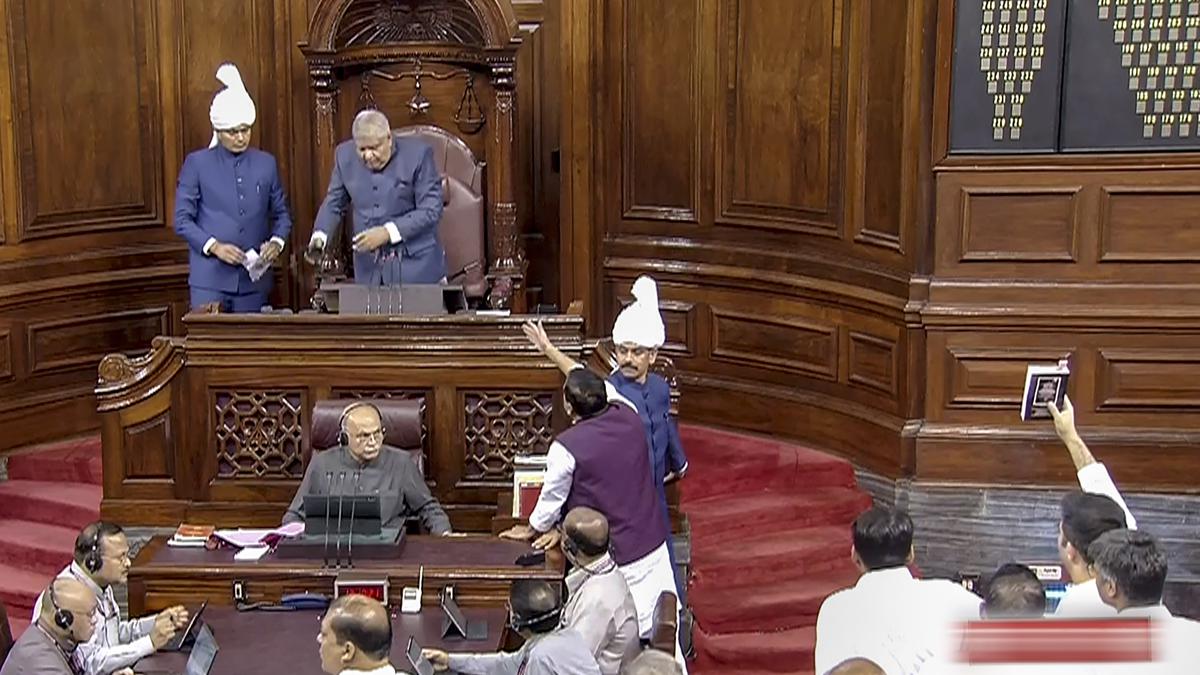
Explained | Why is the Opposition insisting on a debate about Manipur under Rule 267?
The Hindu
Opposition want the Rajya Sabha Chairman to invoke Rule 267 to suspend business and debate Manipur in the Upper House. Read The Hindu explainer on provisions of Rule 267 of the Rajya Sabha rulebook and what is the controversy over it.
The story so far: Since the start of the Monsoon Session of Parliament last week, proceedings in the Rajya Sabha have been marred by continuous protests and disruptions over differences between the Opposition and the Government on the nature of discussion on the Manipur situation.
At the centre of the disagreement is Rule 267 of the Rajya Sabha rulebook, which the Opposition insists should be invoked to discuss the issue in the Upper House. The rule has emerged as a stumbling block, with Opposition MPs filing a string of notices under the rule in the past few days, only to be rejected by Chairman Jagdeep Dhankhar, who in his maiden session last year termed such motions a “known mechanism of causing disruption.”
Also Read | Opposition to move no-confidence motion in Lok Sabha
Both Houses of Parliament function by rules that regulate the procedure and conduct of its business and provide for instruments that can be used by elected representatives to highlight issues of public interest. In Rajya Sabha, these are known as the Rules of Procedure and Conduct of Business in the Council of States, in effect since 1964.
If an MP wants to ask questions, initiate or participate in a debate, or raise an issue of public interest, the Rajya Sabha rulebook requires the legislator to first inform the presiding officer— the Chairman of the Rajya Sabha. This prior information, called notice, must be submitted in writing to the Secretary-General for the consideration of the Chairman. For example, an MP should give a 15-day prior notice to ask starred or unstarred questions and a three-day advance notice for half-an-hour discussions.
The Secretariat compiles notices moved by individual MPs along with the legislative business and other government agenda into a “list of business,” which is then circulated to all Rajya Sabha MPs ahead of the day’s proceedings. An MP can usually take up a matter or initiate a discussion only if the issue finds a mention in the day’s list, as per the rules. However, there are instances when an issue of public importance needs urgent attention. In such instances, the MPs invoke Rule 267 in the Upper House.
Rule 267 allows for the suspension of rules in the pre-decided business of the day with the approval of the Chairman to debate an issue of importance. Under the section “suspension of business,” the Rules of Procedure and Conduct of Business define Rule 267 as an instance where “any Member, may, with the consent of the Chairman, move that any rule may be suspended in its application to a motion related to the business listed before the council of that day and if the motion is carried, the rule in question shall be suspended for the time being.”













